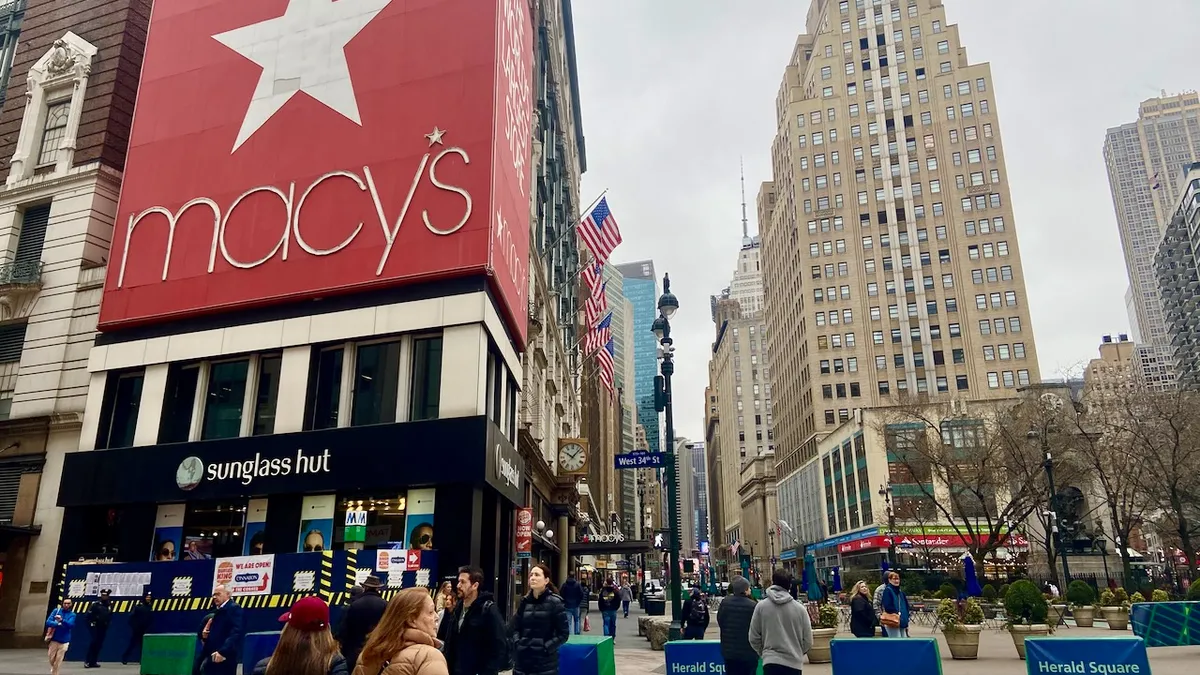Dive Brief:
-
Macy’s Inc.'s board of directors has unanimously voted to end talks with Arkhouse Management and Brigade Capital Management, which in March had offered $6.6 billion or $24 per share to take over the company, the department store said on Monday.
-
The firms in June raised their bid to $24.80 per share but failed to deliver “a definitive, fully financed and actionable proposal,” the department store also said. Macy’s had requested the best price the firms were willing to pay, plus “fully negotiated commitment papers for all the debt and equity needed to finance the revised proposal.”
-
Neither Arkhouse nor Brigade immediately responded to requests for comment. The companies had initiated their takeover proposal in December with an offer of $21 per share or about $5.8 billion, which Macy’s rejected in January.
Dive Insight:
Given Arkhouse’s focus on real estate, its bid in conjunction with Brigade Capital — now close to $6.9 billion — was widely seen as a play to monetize Macy’s property assets rather than transform its retail operations. For many analysts that called to mind the slow deterioration of Sears.
Macy’s footprint has been shrinking for years, almost since the moment of its massive expansion decades ago via mergers and acquisitions. After previous activist pressure to wrest gains from its real estate, for example, Macy’s sold its San Francisco men’s store for $250 million, its Minneapolis flagship for $59 million, a portion of its Chicago Loop flagship for $27 million and its Pittsburgh flagship for $15 million.
More recently, since Arkhouse’s overture, Macy’s has fortified its board’s real estate expertise — including adding nominees favored by Arkhouse — and said that property value will be a factor in deciding which 150 stores will shutter over the next three years.
“Macy’s has played a good game in patiently furnishing the activist investors with information and allowing their nominees to take some seats on the board,” GlobalData Managing Director Neil Saunders said in emailed comments. “As such, it has shown itself to be a willing participant in discussions and has taken the bid seriously, which it must do in the interests of shareholders. However, Macy’s is also right to terminate dealings that were not proving to be fruitful or serious in terms of financing.”
Those dealings were extensive, according to Macy’s press release. The company said it “expended hundreds of hours addressing Arkhouse and Brigade’s extensive diligence requests, facilitating diligence meetings with multiple members of the Company’s senior management as well as its financial and real estate advisors and providing thousands of documents with a level of detail that went well beyond what is customarily required to obtain financing for a public company acquisition, such as providing complete store-by-store P&L’s and full-form leases for each Macy’s, Bloomingdale’s and Bluemercury location.” The communications included the sharing of confidential information, Macy’s said.
All that culminated in what Macy’s described as inadequate information on financing. Arkhouse and Brigade on June 26 handed over a “‘check in’ letter” with their upped bid, which included “highly conditional and unsigned drafts of financing commitment letters, subject to numerous conditions, including, in certain cases, diligence on Arkhouse and Brigade themselves.”
Macy’s also criticized the firms’ submission of asset-based financing that would have been tied to Macy’s own real estate. Securing that would have entailed a tangle of “appraisals, credit rating outcomes, and loan-to-value thresholds,” requiring “lengthy additional diligence, including independent, third-party appraisals” of more than 140 stores and distribution centers.
Meanwhile, the firms didn’t offer much beyond squeezing money from Macy’s real estate, according to GlobalData’s Saunders.
“Indeed, many of the activist investor proposals would have significantly weakened Macy’s and hampered its ability to survive as a retail operation,” he said.
On Monday Macy’s made clear that, with these negotiations in its rear-view mirror, its turnaround, dubbed “A Bold New Chapter,” is now sharply in focus. In May, the company included in its Q1 earnings report several metrics on the stores that will survive the downsizing plan, which it called “go-forward” locations, and on the top 50 stores. While overall Q1 net sales fell 2.7% year over year to $4.8 billion, with Macy’s banner comps down 0.4%, comps at its “go-forward” business, including e-commerce, were flat; comps at go-forward stores rose 0.1% and at first-50 stores rose 3.4%.
The turnaround is helmed by Macy’s Inc. CEO Tony Spring, previously Bloomingdale’s CEO, who took over from Jeff Gennette in February. Saunders credited Spring with having “a much clearer sense of vision and purpose in working to turn the business around.”
“While Macy’s has a lot of work to do, it must be allowed the breathing space and time to enact changes that will put it on a path to growth and add value for investors,” he said. “Arkhouse and Brigade were never part of that long-term vision and the distraction of a sideshow they created must now end.”
















